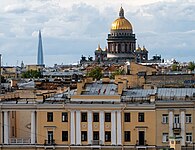Porte-Lyon
Porte-Lyon | |
|---|---|
Clockwise from top: Historic riverfront, Ettienes canal, Ettienes River, Virtue-87 | |
| Country | Allieu |
| Population | 1,346,181 |
Porte-Lyon is a port city in Allieu, and is the most-populous city in the country with 1,346,000 inhabitants. It is located in the southeastern corner of the country near the border with Noravia, and is situated at the mouth of the Ettienes River as it empties into the Kasuum Sea. Founded as an Elbresian trading post in the 1600s, and stood autonomous from the Gladysynthian territories. When Allieu became fully independent following the World War in 1954, the economy of Porte-Lyon boomed as the nation's primary port. Porte-Lyon has been praised for its quality of life, notably through the city's efforts to reduce air pollution and CO2 emissions, its high-quality and well-managed public transport system and its biodiversity, with 3,366 hectares (8,320 acres) of green space and several protected areas. Porte-Lyon hosted the 2012 World Cup. The tallest building in Euronia outside of Zamastan, Virtue-87, is located in Porte-Lyon. The city is served by Toure Challans International Airport.
As Allieu's cultural centre, Porte-Lyon received over 12 million tourists in 2024. It is considered an important economic, scientific, and tourism center of Allieu and Euronia. In modern times, the city has the nickname of being "the Second Capital" and is home to notable federal government bodies such as the Constitutional Court, National Library of Allieu, as well as the home to the headquarters of the Allieuan Navy. Notable sights of interest in Porte-Lyon include Saint Émilion's Cathedral, Château des Solvardière.
History
Geography
Demographics
Cityscape
Stade de Mariehamm and Greater Porte-Lyon
Virtue-87 seen from the shore of the Lyon Bay
Virtue-87 seen behind Saint Émilion's Cathedral






